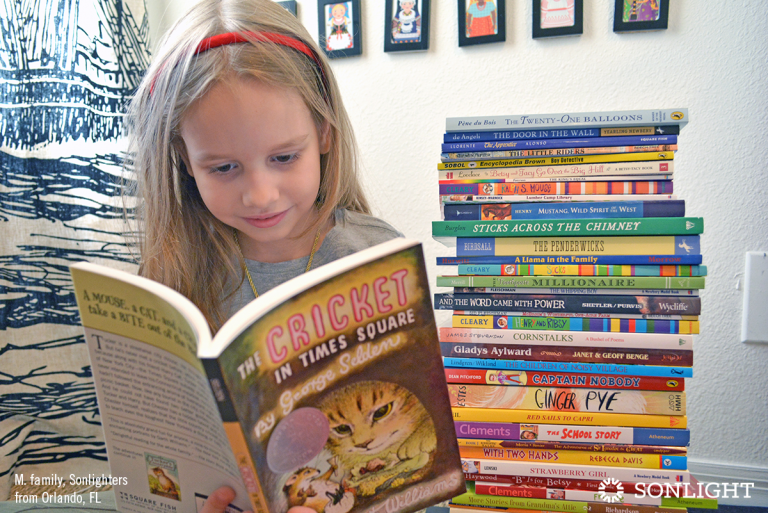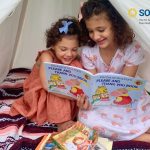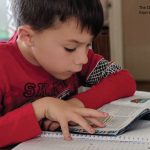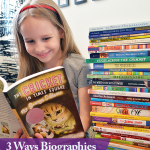Discover how biographies enlighten your children on their adventure of learning.

Biographies are a poignant educational tool, able to leave a lifelong impact. But why exactly does it matter that a literature-based curriculum incorporates biographies rather than simply using textbooks alone? How do biographies enlighten your children on their adventure of learning?
1. Biographies Reveal the Context for Geography and Culture
People’s lives, in context, teach us so much. Once we read Jean Fritz’ Homesick: My Own Story, the Yangtze River is no longer just a squiggly line of cartography. We’re immersed in the bustle of activity around the Hankou city center, and that part of our historical map is brought to life.
When Englishman Hudson Taylor moves to nineteenth-century China and dons traditional Chinese dress, we vividly see the culture of that particular place and time, and our eyes are opened to delightfully diverse differences across cultures. Biographies teach us to view other cultures as particularly and beautifully designed, and not as something which needs to be Westernized upon conversion.
And it’s not just west-to-east-travel stories we should be reading. Reading a wide variety of biographies shapes our global worldview in a positive way, giving us a whole world full of non-stereotypical, nuanced, heroes and heroines of diverse backgrounds.
2. Biographies Enlighten the Context of History and Conflicts
When we read textbook explanations of conflicts in history, we’re given a tidy synopsis of each side’s perspective, and it’s easy to say, “I know what side I would have chosen!” But when we read biographies, we see that choosing sides wasn’t always a simple black and white decision. Biographies reveal the twists and turns such as circumstance and environment, political climate, morals, ethics and beliefs, family ties, physical boundaries of geography, and more.
Textbooks might tell us generalized reasons which spurred waves of immigration, for example, but biographies will clue us into intensely personal reasons behind an individual’s decision to emigrate. Biographies weave an essential human element into the study of history, revealing deep and profound complexities.
3. Biographies Show God’s Hand in the Arc of Time
In our daily lives, it’s easy to lose perspective and view current struggles as disrupting our own plans—I know I am guilty of this all the time. But when we read biographies, we can see how God gently leads his people, and how obstacles and shortcomings become opportunities for His glory. What may be troublesome and even painful in the short term, often is transformed into something we never could have dreamed or imagined. Reading stories like this gives us courage, and strength to persevere.
Biographies also have the potential to make indelible marks upon our lives. As a little girl, curled up on our grey woven couch halfway across the world from here, I read about a young Amy Carmichael—when she was my own age!—pleading for God to miraculously change her brown eyes to blue. Her eye color didn’t change, of course, and years later, those brown eyes allowed her to disguise herself in India and rescue countless girls from a lifetime of temple abuse. I’ll never forget how her prayer for blue eyes wasn’t answered the way she originally hoped; no, God’s answer was so much more powerful. And yet, her life wasn’t without suffering. In her years of being bedridden, Amy Carmichael wrote page after page of profound and impactful poetry.
In Psalm 119, the psalmist prays, “[Lord,] order my steps.” When we read biographies, we get a glimpse into that glorious ordering. In the course of our own lifetime, we will encounter trials and suffering. We may even endure days and years which are so achingly painful, we might even feel as though they are a waste. But someday, when we no longer see through a glass dimly (I Corinthians 13:12), when the arc of our life is viewed in light of eternity, we will see how God has woven it all together—the agonizing twists and turns we didn’t understand, the seemingly unfulfilled prayers, the untidy ends, the tangled threads, the knotted mess—into a beautiful tapestry beyond compare.
“Not in vain, the tedious toil,
On an unresponsive soil,
Travail, tears in secret shed,
Over hopes that lay as dead.
All in vain, thy faint heart cries.
Not in vain, thy Lord replies;
Nothing is too good to be;
Then believe, believe to see.
Did thy labor turn to dust?
Suffering—did it eat like rust,
Till the blade that once was keen,
As a blunted tool is seen?
Dust and rust thy life’s reward?
Slay the thought: believe thy Lord,
When thy soul is in distress
Think upon His faithfulness.
Though there be not fig nor vine,
In thy stall there be no kine,
Flock be cut off from the fold,
Not a single lamb be told,
And thy olive berry fall
Yielding no sweet oil at all,
Pulse-seed wither in the pod,
Still do thou rejoice in God.
But consider, was it vain,
All the travail on the plain?
For the bud is on the bough;
It is green where thou didst plough.
Listen, tramp of little feet,
Call of little lambs that bleat;
Hearken to it. Verily,
Nothing is too good to be.”
-Amy Carmichael
See the power of biographies firsthand. Try three weeks of any Sonlight Instructor's Guide for free. Click here to get one for any level, preschool through twelfth grade.








